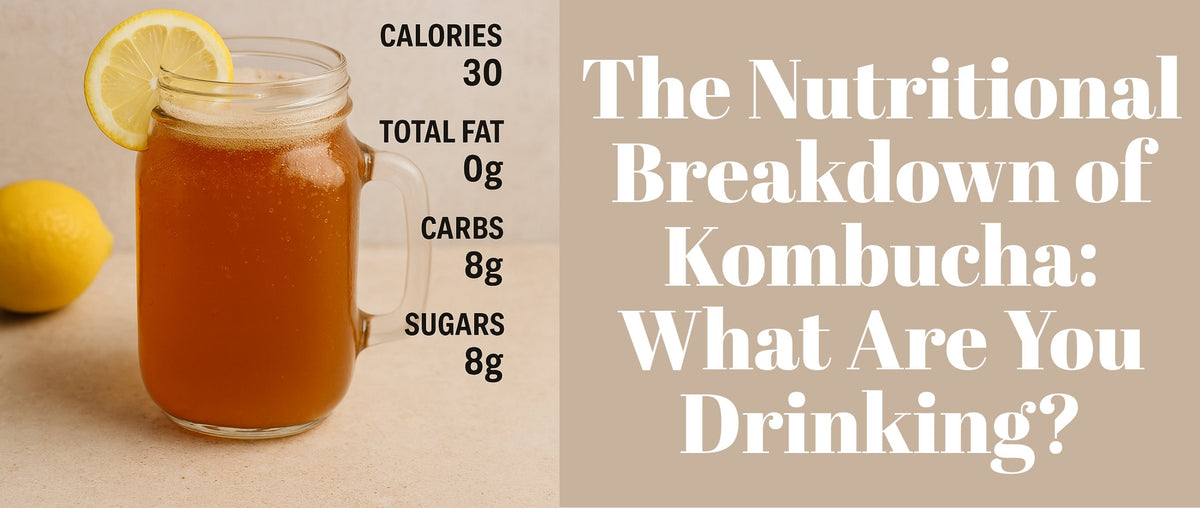The Nutritional Breakdown of Kombucha
Kombucha has become one of the most popular healthy drinks in recent years, often promoted as a gut-friendly beverage with numerous health benefits. This fermented tea is packed with probiotics, antioxidants, and organic acids that support digestion, boost immunity, and enhance overall well-being. But what exactly is in your glass of Kombucha?
Understanding the nutritional breakdown of Kombucha is essential, especially if you're following a vegan diet or searching for cholesterol-free foods. Many people assume it's just another health drink, but depending on the brand and preparation method, Kombucha can vary significantly in sugar content, probiotic concentration, and calorie count.
In this article, we’ll take a deep dive into the nutrition of Kombucha, compare it with other beverages, discuss its benefits, and help you decide whether it belongs in your diet.
Key Takeaways
- Kombucha is a fermented tea rich in probiotics, organic acids, and antioxidants.
- It is generally low in calories but may contain varying amounts of sugar.
- Homemade Kombucha allows better control over sugar content.
- It can be a good alternative to soda, fruit juice, and even an apple cider vinegar drink.
- Kombucha supports gut health, immunity, and digestion, but excessive consumption may cause side effects.
What is Kombucha?
Kombucha is a fermented beverage made by combining tea, sugar, and a symbiotic culture of bacteria and yeast (SCOBY). During fermentation, the bacteria and yeast break down the sugars into organic acids, probiotics, and a small amount of alcohol, giving Kombucha its signature tangy flavor and effervescence.
While kombucha India has gained popularity among health-conscious individuals, it’s essential to understand that not all Kombucha is created equal. Some store-bought varieties contain added sugars and artificial flavors, which can impact their overall health benefits.
Also Read
Nutritional Breakdown of Kombucha
1. Macronutrient Composition
| Nutrient | Per 240ml (8oz) Serving |
|---|---|
| Calories | 30–60 kcal |
| Carbohydrates | 7–14g |
| Sugars | 4–12g |
| Protein | 0–1g |
| Fats | 0g |
Kombucha is generally low in calories and contains moderate amounts of carbohydrates, mainly from natural sugars. However, flavored and store-bought varieties often contain more sugar than homemade Kombucha.
2. Vitamins and Minerals in Kombucha
| Vitamin/Mineral | Health Benefits |
|---|---|
| B Vitamins | Support metabolism and energy production |
| Antioxidants | Help fight inflammation and oxidative stress |
| Organic Acids | Aid digestion and support gut health |
Since Kombucha is made from tea, it also contains polyphenols, which are antioxidants known for their heart-healthy properties.
Kombucha vs. Other Beverages: A Comparison
| Beverage | Calories | Sugar | Probiotic Benefits |
|---|---|---|---|
| Kombucha | 30–60 | 4–12g | Yes |
| Green Tea | 0 | 0g | No |
| Soda | 150+ | 40g | No |
| Fruit Juice | 120–150 | 30g | No |
Unlike soda or juice, Kombucha provides probiotics and organic acids that promote gut health. This makes it an excellent alternative for those seeking a cholesterol-free and low-sugar beverage.
Health Benefits of Kombucha
1. Gut Health & Probiotics
Kombucha contains live probiotics, similar to fermented foods like vegan cheese and unsalted butter.
2. Immune System Support
Thanks to its antioxidants and organic acids, Kombucha helps strengthen the immune system—making it ideal for a vegan diet.
3. Heart Health & Cholesterol Reduction
Some studies suggest Kombucha can help reduce LDL (bad cholesterol) and increase HDL (good cholesterol).
4. Weight Management
Kombucha may aid in weight loss and metabolism, similar to an apple cider vinegar drink. Opt for low-sugar kombucha if this is your goal.
Potential Risks & Side Effects
- High Sugar Content – Some commercial kombuchas are high in sugar.
- Alcohol Content – Naturally occurring due to fermentation.
- Acidity – May cause discomfort for sensitive individuals.
Tip: Read labels and select low-sugar or homemade kombucha whenever possible.
Store-Bought vs. Homemade Kombucha
| Factor | Store-Bought | Homemade |
|---|---|---|
| Sugar Content | Can be high | Can be controlled |
| Alcohol Levels | Regulated | Can vary |
| Probiotic Content | Standardized | May vary |
Best Kombucha for Different Diets
- Vegan Diet: Pair with vegan butter, cashew butter, and plant-based cheese.
- Keto Diet: Choose low-carb, minimal sugar options.
- Gluten-Free: Most kombucha brands qualify, but always verify.
How Much Kombucha Should You Drink?
Start with 4–8 oz/day. Beginners should begin with small amounts to test tolerance.
Final Thoughts & Recommendations
Kombucha is a versatile, probiotic-rich drink that fits easily into a vegan diet, a quest for cholesterol-free foods, or a general healthy lifestyle.
Combine with vegan products such as oat milk, fresh mozzarella, and vegan items like fat free cheese for a balanced diet.
Would you like to explore Kombucha brands in India or homemade kombucha recipes? Let us know!
Do you enjoy vegan food? We have a list of vegan restaurants in India to help you find delicious options in your area!












